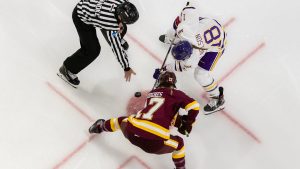 Each coach and program have different criteria for what they look for on the recruiting trail. Sure, everyone is looking for talent on the ice, but there’s so much more that goes into a player’s makeup. There are players every program wants, but for up-and-coming teams that may not be able to land those recruits, they’re looking for players that see the benefit and potential of helping build a program and putting in the hard work now to help future teams see a payoff.
Each coach and program have different criteria for what they look for on the recruiting trail. Sure, everyone is looking for talent on the ice, but there’s so much more that goes into a player’s makeup. There are players every program wants, but for up-and-coming teams that may not be able to land those recruits, they’re looking for players that see the benefit and potential of helping build a program and putting in the hard work now to help future teams see a payoff.
Those are the players who Minnesota State coach John Harrington wants on his team. The Maverick program has slowly been improving under Harrington’s tenure as head coach, culminating with a fifth place finish in the WCHA last season. The season before he took over the reins, MSU won a single conference game. In his first season, they were winless in the WCHA.
“I want a chance to try to develop something here … It’s hard to change your team around. It has to be done with good recruiting and then developing what you have. And it’s not just developing the players individually, but developing into a team that thinks alike and that plays together – (a team) that can be possibly better than the sum of the parts,” he said.
Harrington saw the Mavericks head coaching job as a challenge – something he said he’s never been known to back down from. He looks for the same personality traits in his players.
“You have to find the person, with the right makeup, that wants to take on that challenge and contribute to a program that’s on the rise,” said Harrington.
The Mavericks rose a little higher on Saturday with a 4-2 win over then-fourth-ranked Minnesota Duluth. On the one hand, it’s a single win and Harrington pointed out his team is only as good as their next game, not as good as their last. On the other, for a team like Minnesota State to continue to improve, they need to bring in better players. Marquee wins like Saturday’s play a big role in being able to do so.
It’s a cyclical problem with no clear solution. Teams need better players to be able to win. Better players don’t choose to play for programs that don’t win. Any time a program like Mankato can get their name out there and capture national attention with a big win, it has ripple effects that have a big impact on how the program can grow in the future.
“I don’t think any coach can say that they haven’t been a better coach when they’ve had better players,” said Harrington. “Young players know who the successful programs are and it’s our job to try to convince them we can have that at other places, as well. That’s what we’re trying to do at Minnesota State, is show them that we can be competitive with the top teams in the league and challenge for WCHA championship and we know if we do that, then we’ll certainly be in the conversation for national championship.”
That’s the long term. In the short term, wins like Saturday energize the players and help to reinforce the things the coaches have been teaching them. It’s one thing for Harrington and his staff to model things in practice or on a white board. When the team plays well and gets results, the staff can point things out in the game film and watch his players buy in just a little bit more.
The win was big for who it was over, but it was also an important bounce-back after a 7-0 loss on Friday. One way the Mavericks have been able to improve over the past few seasons has been in their ability to win and hold on to the puck. Playing good defense has allowed Minnesota State to be a more offensive team overall. They aren’t chasing and playing catch up. They’re controlling the run of play, possessing the puck and playing well away from the puck. Those are the things that went right on Saturday and led to a win.
“It’s just one step in the process that we’re trying to get to to be a consistent team. Whatever that effort was, whatever it took to beat UMD, we’ve got to have that same type of effort and that same time of performance when we play the next weekend,” said Harrington. “We can have these nights. When will we have them all the time? I’m not sure, but we have to prepare like we’re going to have them all the time because if we don’t, then we won’t have them at all.”

Comments are closed.